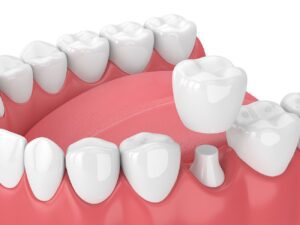If you sustain damage to your tooth in any way, call your dentist as soon as you can. They will likely employ a dental crown to restore your dental structure and protect your smile. This ceramic cap will be placed over a vulnerable tooth, and a dentist will seal it into place using dental cement.
You can feel more confident about undergoing dental work when you know the advantages this dental solution can provide. Read on to learn about four of the many uses of dental crowns when it comes to enhancing your oral health.

4 Benefits from Dental Crown Treatment
Replace Weak Tooth Enamel
Your teeth have a hard outer layer called enamel. Though durable, enamel may wear down over time, sometimes due to factors outside of your control like aging. But thinned or weakened enamel can create vulnerable spots in your teeth.
Harmful residues can reach the interior of the teeth and cause decay and other problems. Once gone, the enamel will not regenerate. You will need your dentist to intervene to protect your smile once again.
A dental crown will cover weakened enamel, shielding the tooth from further oral health concerns. This will also relieve tooth sensitivity and other discomforts that can occur due to exposed dentin.
Fix Broken Teeth
Your teeth experience wear and tear from chewing and biting without issue usually. However high pressures or awkward bite angles can cause a tooth to break. This dental injury will require urgent evaluation and treatment from a dentist. A crack or chip in the tooth can deepen and worsen over time and heighten the patient’s risk for other dental problems.
Your dentist can use a dental crown to restore the structure of the tooth after this breakage. It will reshape the tooth and stop plaque and other dental dangers from harming your smile through this injury.
Brighten Discolored Teeth
Though known as a restorative dental treatment, a dental crown can enhance the appearance of your smile too. Dentists build crowns on a custom basis for their patients to ensure a secure fit and natural-looking finish.
This means the dentist can factor in the patient’s smile aesthetic goals when constructing the dental fixtures as well. A tooth-colored crown can go over a tooth with stubborn stains or severe discoloration. It will give it a brighter look that will resist staining. This effect can last as long as the crown remains, which may be for fifteen or more years.
Support Other Dental Solutions
Dental crowns provide effective oral health advantages on their own. But these fixtures can also serve as support for other dental treatments. For instance, a crown can be an ideal prosthetic tooth atop a single dental implant.
Dentists also use crowns to cover and protect a tooth after treatment for advanced tooth decay. The ceramic cap shields a larger area than a dental filling can, offering more extensive benefits that will last longer than a filling.

